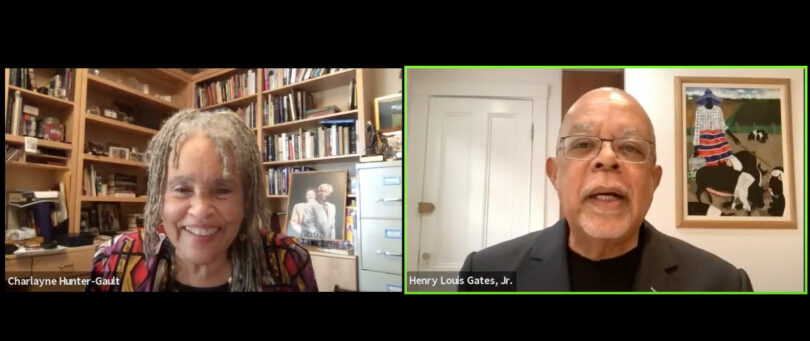Peabody Award-winning historian Henry Louis Gates, Jr. remembers that “awful, historic day” when Charlayne Hunter-Gault became one of the first two Black students to enroll at the University of Georgia.
About 60 years ago, Gates watched the day unfold on his family’s 12-inch television set in Piedmont, West Virginia, where he grew up and where his family had lived for 200 years.
Gates, an award-winning literary scholar, journalist and filmmaker, sat down with acclaimed journalist Hunter-Gault to interview her about both her time at UGA and her career during the 2021 Holmes-Hunter Lecture, held virtually Feb. 23.
“I watched that news footage,” Gates said. “I was nine years old, and it never occurred to me that I would ever meet either this young woman, who was so bravely being ushered by this tall, brave man through a nightmare of venom and hostility and animosity. I looked at her and thought, ‘I couldn’t have done that.’”
‘Don’t fall down’
Hunter-Gault began by dedicating the lecture to the late Hamilton Holmes, who helped her integrate UGA in 1961. Holmes, who passed away in 1995, attended the same high school as Hunter-Gault, and the two had concrete aspirations and were hand-picked by the NAACP to put Brown v. Board into action in the South.
Their integration of the university in the ’60s was inspiring to Gates, and he said their actions worked to represent not just the individual, but the entire Black race.
“Any flaw that we had could be used against us,” Gates said. “She was representing me and my mom, my dad and my brother, who was an oral surgeon, who all gathered around that TV. ‘Don’t fall down, sister. Do your homework, don’t flunk out—you’re representing the race.’ And that’s how it worked.”
Aside from the tremendous pressure of integrating an all-white university in the South in the 1960s, Hunter-Gault also faced everyday situations created to test her patience.
“Three days after I entered the University of Georgia, there was a riot outside my dorm, and I was suspended after tear gas dispersed the crowds, albeit late. The police seemed to want them to be there as long as they could be there,” she remembered.
Still, Hunter-Gault wasn’t afraid.
Many days, she would go to class and return back to her dorm, only to realize that she had gone the whole day without anyone speaking to her. Another “norm” for Hunter-Gault that her white classmates didn’t have to face.
She lived alone in a dorm, and the students who lived above her would often stomp their feet at odd hours, hoping to disrupt Hunter-Gault’s studies or sleep. Her sorority sisters had given her a Nina Simone album to listen to when she got the news that she was admitted to UGA, and it came in handy.
“When those students were beating on my ceiling, I was listening to Nina Simone,” she said.
Even though there was division and hatred then, Hunter-Gault told Gates that there were a few stand-out moments of kindness that surprised her.
For example, because the cafeteria wasn’t integrated, Hunter-Gault was forced to eat in her room. One day, to her surprise, a group of young Jewish women knocked on her door and asked to cook dinner for her.
“Throughout the evening, they began to introduce me to something that I had not known, which was Jewish people, and … they said, ‘We are not going through what you’re going through, but the history of our people is such that we can empathize with you,” Hunter-Gault said. “It was just an amazing time.”
Holmes was another friendly face who was always there to lift Hunter-Gault up, she said.
“Although it was an unusual situation, there were people who wrapped their arms around me,” she said. “I used to have stomach pains, and now that I look back, it might’ve been a little PTSD or something, but the one person who would always show up when I was in the school infirmary was Ham.”
Giving voice to the voiceless
After Hunter-Gault graduated in 1963 with her bachelor’s in journalism, she went on to anchor the local evening news in Washington, D.C., through WRC-TV. During her extensive career, she also reported for The New York Times, The MacNeil/Lehrer Report, The NewsHour, National Public Radio and CNN.
In light of her impressive career in journalism, Gates also asked Hunter-Gault about her take on the news industry today.
“I think we’re in a moment where we have to stand back and look at ourselves and ask, ‘Why are we here?’” she said. “We’re going to have to work really hard to figure out again, how we can produce news that the public can use. That’s why we exist—to give them information to make good decisions about their lives.”
Hunter-Gault and Gates also discussed the importance of good journalism, especially in situations where they aim to “give voice to the voiceless.”
“These young students are saying, ‘Wait a minute. You’re in America now. This is not going to happen here. We’re going to expose this,’” Hunter-Gault said. “We have to figure out how we can support our local journalism, our journalism at UGA.”
She praised young students in particular who cover issues that relate to people of color.
“We’ve got some amazing work that’s going on with these young people, and I’m just so thrilled that I’m aware of it and in some ways, I’m a part of it, helping to enable it, because hopefully these young people won’t stop there,” Hunter-Gault said.
Gates, who is one the board of directors of Pro Publica, agreed and emphasized that today, more diverse voices in journalism—particularly in investigative journalism—are needed.
“Charlayne, I want to thank you for inspiring me at the age of nine,” Gates said. “I still don’t know if I’m brave enough to walk through those columns of racists screaming, but you were, and because of that, everything changed.”





